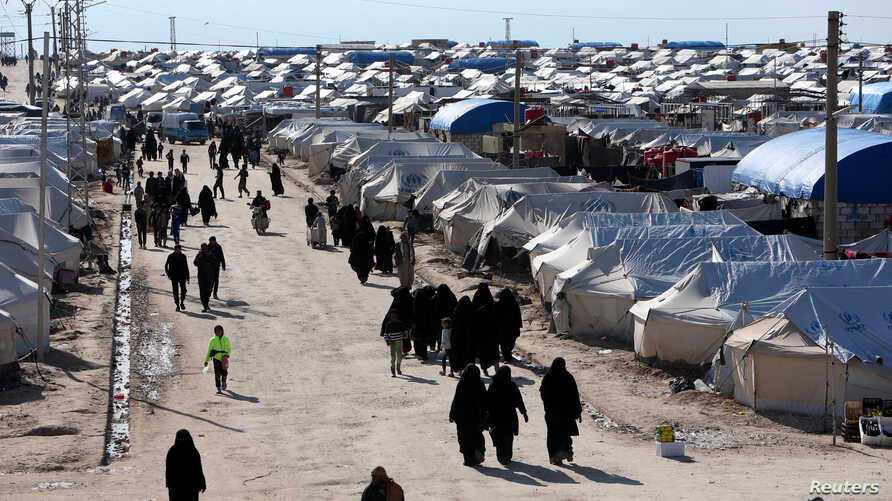Strain of Islamic State Prisoners, Families Gnaws at Key Alliances

WASHINGTON – The struggle to make a future for thousands of captured Islamic State fighters and their families currently in makeshift prisons and overcrowded displaced persons camps across northeastern Syria may be starting to erode key partnerships in the fight against the terror group.
Most of the burden for guarding and caring for these volatile populations has fallen to the U.S.-backed Syrian Democratic Forces. But SDF officials say they are increasingly frustrated over what they perceive as Washingtons unwillingness to intervene and stop Turkey, also a member of the anti-IS coalition, from actively breaching security at the camps.
Officials with the SDF and the Autonomous Administration of North and East Syria (AANES), the political body that governs the region, tell VOA they have repeatedly shared evidence of the Turkish operations to aid IS, also known as ISIS or Daesh, with the United States, but to no avail.
“A special committee should be formed to investigate the issue of human trafficking and the involvement of the official Turkish Intelligence Agency,” the AANES wrote in a recent letter to the U.S. and other coalition partners, obtained by VOA.
“Turkey is smuggling ISIS women from al-Hol [displaced persons] camp,” it added, using another acronym for Islamic State.
The letter, which appears to be undated, goes on to detail what the AANES claims are at least five attempts by Turkish operatives to help break IS-affiliated men, women and children out of al-Hol, all spanning a two-week period in July.
Ankara denies the allegations, instead blaming the Kurdish-led SDF, which it maintains is linked to the Turkey-based Kurdistan Workers’ Party (PKK), which the U.S. has labeled as a terrorist organization, and its Syrian offshoot, the People’s Protection Units (YPG).
“The PKK/YPG released large groups of ISIS/DAESH affiliated FTFs (foreign terrorist fighters) on 16 different occasions, through shady deals made in exchange of money,” the Turkish Embassy in Washington told VOA in a statement.
The embassy also said Ankara continues to advocate for the “immediate repatriation of FTFs and their families,” noting what it described as minimal sanitary and security conditions in the camps… and the abuse that especially women and children are subjected to.”
Officials with the U.S.-led coalition declined comment on the SDF and AANES allegations. And senior U.S. military officials said if there is reason to suspect Turkey of wrongdoing, they have not seen it.
“I don’t have any evidence, that I’m aware of, that anybody’s been smuggled out of the [al Hol] camp,” the commander of U.S. Central Command, Gen. Frank McKenzie, told an audience during an online forum this past week [Wednesday].
U.S. diplomats have, likewise, tried to downplay any concerns.
“We are generally satisfied with the situation in northeast Syria,” said Amb. James Jeffrey, the U.S. special representative on Syria.
“We listen to everything that the SDF raises with us, that the Turkish government raises with us,” he added.
Only Kurdish officials in northeast Syria argue the evidence against Turkey is mounting.
“There was a group within Turkish intelligence that is in contact with the families of ISIS women [from] various countries,” the letter states. “This group works to abduct women to sell them to their families in exchange for a large amount of money or to reuse them to revive ISIS.”
“Some of those women were proved to be found in the Turkish-occupied regions in Syria,” it adds.
In one incident detailed in its letter to the U.S. and other coalition members, the AANES said security forces arrested five IS women with Russian citizenship, and 13 children, as they tried to escape.
Four other incidents involved another 14 adults and 11 children, all attempting to escape al-Hol by hiding in tanker trucks used to supply the camp with water, the letter said, adding one of the truck drivers admitted to having already smuggled another 11 IS affiliated persons out of the facility.
Kurdish officials also point to another incident in mid-July, in which Turkish security sources bragged to Turkish media that their intelligence operatives had freed a Moldovan woman and her four children from al-Hol.
The Turkish sources identified the woman as Natalia Barkal and said she had moved to Syria with her husband in 2013. They added that Barkals husband had been killed during fighting, and that she had been living at the al Hol camp since January 2019.
SDF officials told VOA Barkal had arrived at al-Hol, along with thousands of other women and children affiliated with IS as the terror group lost control of its Syrian territory.
“Turkish intelligence is making great efforts and providing financial support,” the Kurdish officials said in a statement issued following Barkals escape.
“[We] call upon the whole world to hold Turkey responsible for smuggling and receiving Daesh members,” the statement added. “These practices are consistent with attempts to place Syria, the region, and the world under the threat of Daesh.”
When asked about the incident at the time, a State Department spokesperson referred all questions to the Turkish government, which has yet to make any official statement about the operation.
The SDF is holding as many as 10,000 IS fighters, including about 2,000 foreign fighters, in prisons across northeast Syria. At least another 11,000 IS women and children are being held at al-Hol and other nearby displaced persons camps, also under SDF guard.
U.S. officials have been leading the push for countries to repatriate their citizens and prosecute those who are suspected of having fought for or committed crimes under IS. Many countries, however, have been reluctant to do so.
[contfnewc]
[contfnewc]
[contfnewc]
[contfnewc]
Read from source [contfnewc]
[contfnewc]
[contfnewc]
[contfnewc]
















